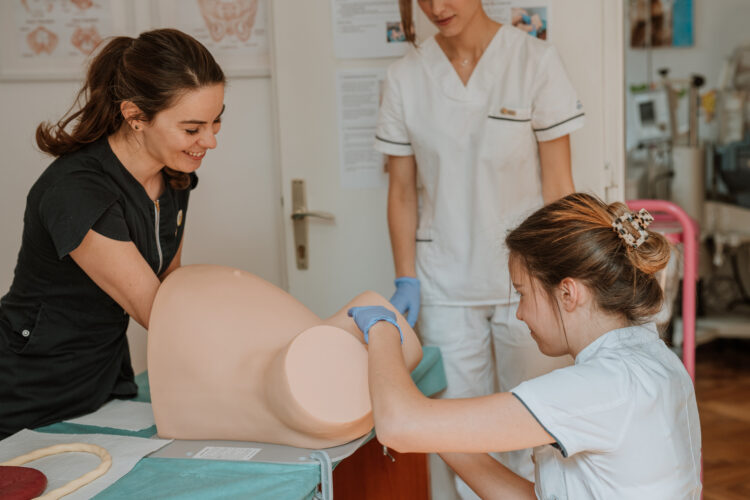The Job Insecurity of Midwives in Spain

Authors: Elena Fernández García and Irene Barba Mercado
Midwives are key professionals in the Spanish public healthcare system who assist women and people of different genders from first menstruation through to menopause, taking care of their sexual, reproductive, maternal, newborn and adolescent health (SRMNAH). They are a core part of the system and do a complex job, not only on account of the knowledge and techniques required, but also because of the psychosocial competencies they need to have. Nevertheless, despite the high degree of training and responsibility involved in this role, the employment reality of many midwives in Spain is far from stable, motivating and fair. Job insecurity has become the norm: temporary contracts, the shortage of structural positions, territorial inequality and a lack of professional acknowledgement and advancement.
Midwife training in Spain is very demanding and is compliant with the European guidelines. After taking a four-year degree in Nursing, candidates must sit a national examination (EIR), which usually takes quite a long time to prepare for, after which they do a two-year specialised internship in Obstetrics and Gynaecology, often somewehere else in the country depending on the grade they get in the examination. Nevertheless, at the end of this period, many midwives face a scenario conditioned by contractual insecurity.
Insecurity and reality in Spain
Often, instead of obtaining a stable position in public health, midwives are obliged to make do with temporary stand-in positions or casual contracts that sometimes last barely a few days. They are often called at very short notice to cover shifts in hospital or a different healthcare centre every week. This is a country-wide reality, with territorial variations, and where all too often human resources managers systematically relegate midwives to a back-seat position. Specialised training, far from guaranteeing stability, becomes a gateway to insecurity.
All too often, the range of services is markedly resource-centred and fails to leverage the potential and the knowledge of other professionals, and midwives are no exception. Women, their families and their communities could benefit enormously from listening to and appreciating what midwives have to offer the system —in hospitals and delivery rooms, maternity centres, home births and community health through health centres.
Investing in midwives is not a whim and nor is it about defending the interests of a single professional collective: it is an urgent health care need. Our government talks about equality, public health, about the humanisation of giving birth. However, these utterances are clearly disproved by reality: temporary contracts of employment, never-ending shifts, lack of staff, lack of coverage for holidays or sick leave, frozen wages and under-representation in decision-making. Midwives need real policies that will improve their working conditions and allow them to work and live with dignity.
Impact on healthcare and key data
Rather than consolidate teams and guarantee continuity, temporary employment undermines healthcare quality. In Primary Care and hospitals, this situation hampers the continuity of the care provided by midwives, who are a guarantee of trust and good outcomes. This lack of stability also prevents midwives from practising their profession to the full at all healthcare levels.
According to the Spanish National Statistics Institute (INE), in 2023 there were 10,286 nurses fully qualified as midwives in our country, 8,084 of whom were state-registered. However, not all of them practice as such: a substantial number of them work in general nursing due to the lack of specific positions. In Primary Care, there are barely 2,300 midwives for the entire country, which can often mean that a single professional has to take care of thousands of women from different places, particularly in rural or geographically disperse areas. In hospitals, childbirth services are often short-staffed and one midwife may have to take care of several women in labour at the same time.
This job insecurity is compounded by an ageing workforce. In the coming years, a major percentage of midwives currently practising are expected to retire, while the available training vacancies will probably be insufficient to guarantee the necessary generational handover and growth. The lack of medium-term planning also threatens to compound this shortage of employees and increase the healthcare burden even further. This burden, coupled with the temporary nature of employment, increases the risk of stress, anxiety and burnout and impacts talent retention. Moreover, wage differences compared to general nursing and the lack of professional acknowledgement and recognition drive some professionals to other jobs or even to leave the healthcare system.
A solution that combines efforts
This is not happening only in Spain. In many countries, healthcare professions with a high percentage of female employees receive less recognition and investment; midwives are no exception. Spain needs to invest in midwives and offer job stability in order to retain talent and to attract new professionals. This step is indispensable if we are to have more midwives that can cover the population’s SRMNAH needs and guarantee the continuity of the healthcare provided by midwives. On a global level, the lack of investment is so overwhelming that estimates calculate that the world needs one million more midwives to guarantee close, quality and evidence-based healthcare. This priority is aligned with international efforts to sustain existing midwives, improve their conditions and attract new professionals wherever they are needed.
For all these reasons, supporting a petition such as the one launched by the ICM is vital. The One Million More Midwives petition calls upon governments to invest in male and female midwives, acknowledging their role as key healthcare providers, and to implement policies that will enable them to practice fully with safe and respectful healthcare; provide them with the training, skills and resources they need in supportive settings that facilitate their work; and invest in leadership in midwifery so that they can bring an influence to bear on decision-making and collaborate in equal conditions with other professionals.
A great deal remains to be done for midwives in the world and in Spain, and while it is evident that a single petition will not solve everything, it is the first major step towards giving us the visibility we need.
References
- Consejo General de Enfermería (2024). La falta de matronas pone en riesgo la salud de las mujeres en España [The shortage of midwives endangers women’s health in Spain]. Retrieved from: https://www.consejogeneralenfermeria.org
- Instituto Nacional de Estadística (INE) [National Statistics Institute]. (2023). Estadística de profesionales sanitarios colegiados [Registered healthcare professional statistics]. Madrid: INE.
- Rodríguez, M., Gómez, L., & Pérez, A. (2023). Estrés y burnout en matronas del sistema sanitario público español [Stress and burnout in midwives in the Spanish Public Healthcare System]. Revista Enfermería Global, 22(2), 75–89.
- Sindicato de Enfermería (SATSE). (2022). Grave déficit de matronas en Atención Primaria [Severe Shortage of Midwives in Primary Care]. Madrid: SATSE.
- SATSE. (2024). Informe sobre precariedad y temporalidad en el personal de enfermería especializada [Report on insecurity and the temporary nature of employment among specialised nursing personnel]. Madrid: SATSE.
The world needs One Million More Midwives
Sign the petition and help us collect one million signatures to demand one million more midwives — and the investments needed to make it happen.
